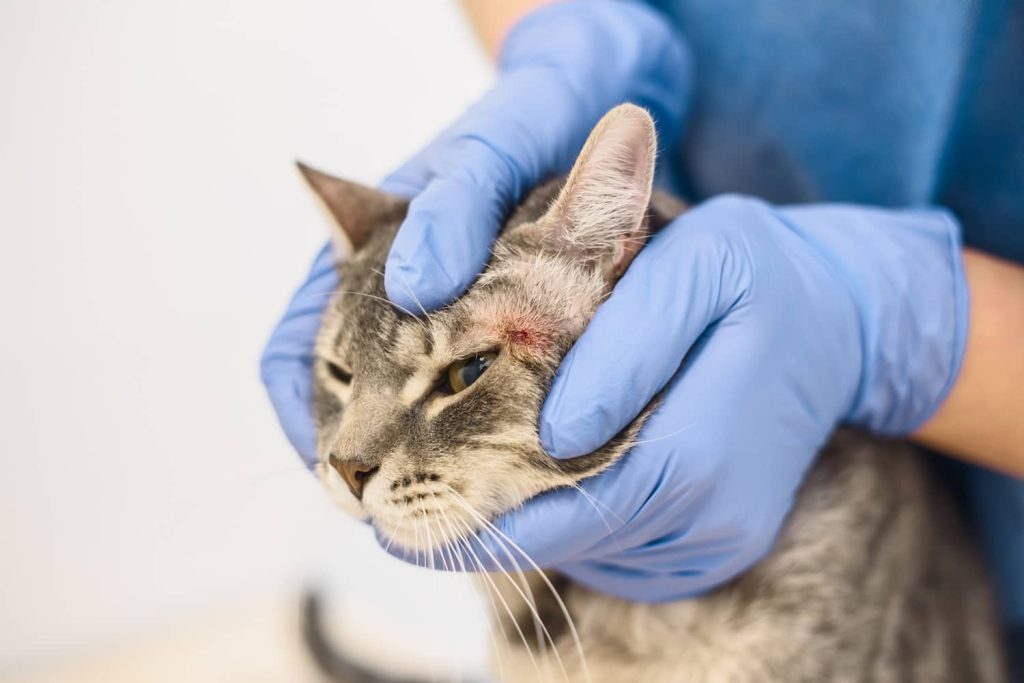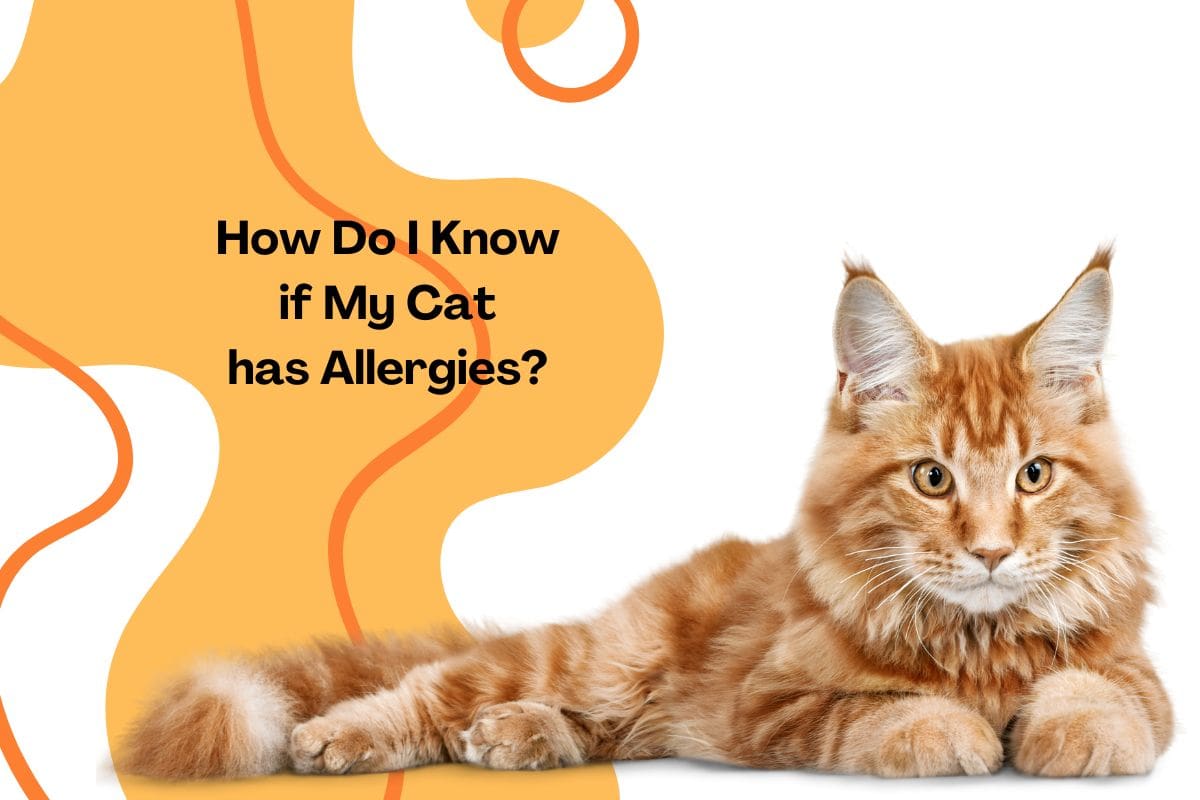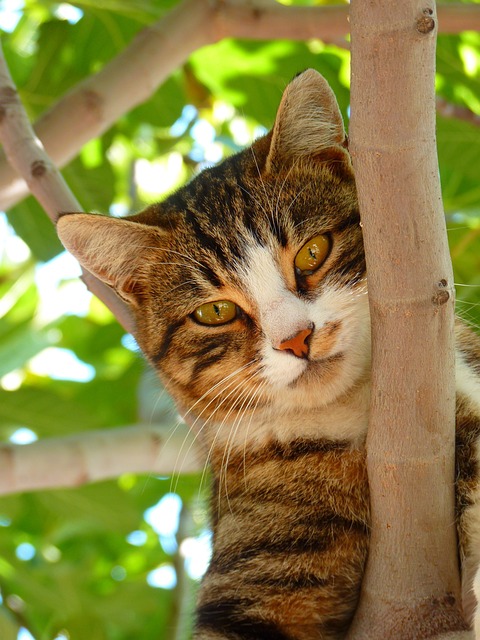Allergies aren’t just a human problem, cat allergies are surprisingly common and can make life uncomfortable for many felines. Just like us, a cat’s immune system sometimes reacts to everyday substances that are normally harmless. These substances, called allergens, can come from food, pollen, dust, or even fleas. When a cat’s body misidentifies an allergen as dangerous, it triggers inflammation and irritation that lead to the classic signs of an allergic reaction.
If your cat keeps scratching, licking, or seems constantly uncomfortable, cat allergies might be the reason. Understanding how these allergies develop and what causes them is the first step toward helping your cat feel better and live a healthier, happier life.
What Exactly Are Cat Allergies?
A cat allergy is essentially an overreaction of the immune system. Normally, the immune system protects the body from harmful invaders like bacteria or viruses. But in allergic cats, the immune system mistakenly identifies a harmless substance — such as pollen, certain foods, or flea saliva — as a threat. This triggers an inflammatory response that causes itching, swelling, coughing, or digestive upset.
Most allergens are harmless by nature, but in sensitive cats, they can cause anything from mild skin irritation to severe respiratory distress. Allergies often last for life, and while they can’t be cured, they can definitely be managed with the right care and lifestyle adjustments.
Can Cats Really Have Allergies?
Yes and it’s more common than many pet owners realize. Allergies in cats are one of the most frequent reasons for vet visits, and they can affect cats of all breeds and ages.
While some purebred cats like Siamese, Abyssinian, or Devon Rex may have a higher tendency toward certain allergies, any cat can develop them. Cats can also suffer from more than one type of allergy at once, which makes diagnosis and treatment a bit more challenging. That’s why it’s important to work closely with your veterinarian if your cat shows signs of discomfort.
Early intervention is key. The sooner you identify and control the allergen, the better your cat’s long-term quality of life will be.

The Main Types of Allergies in Cats
Veterinarians usually group feline allergies into six main types, depending on what triggers them and how they affect the body:
- Food Allergies – A reaction to a specific ingredient or protein in your cat’s diet.
- Environmental Allergies (Atopic Dermatitis) – Triggered by things like pollen, mold, or dust.
- Flea Allergy Dermatitis – Caused by sensitivity to flea saliva.
- Contact Allergies (Allergic Contact Dermatitis) – When something touches the skin and causes irritation.
- Drug Allergies (Cutaneous Drug Eruptions) – When a medication leads to a skin reaction or other symptoms.
- Allergic Bronchitis (Feline Asthma) – An inflammatory response in the airways, often triggered by airborne irritants.
Each type comes with its own signs, triggers, and treatments — but they often overlap, which is why proper veterinary testing is so important.
Signs and Symptoms of Cat Allergies
Cats with allergies can show a wide variety of symptoms. Some are obvious, like scratching or hair loss, while others are more subtle and can easily be mistaken for other problems. Here are the most common signs to watch for:
- Constant scratching, licking, or overgrooming
- Red, swollen, or crusty skin
- Bald patches or thinning hair
- Sores, scabs, or small bumps
- Sneezing, coughing, or wheezing
- Watery eyes or nasal discharge
- Vomiting or diarrhea
- Changes in appetite or weight loss
- Facial swelling, especially around the lips, eyes, or nose
- Hives or raised welts on the skin
- Shortness of breath or difficulty breathing
If your cat is breathing with an open mouth, struggling to inhale, or seems lethargic, it’s a medical emergency — get veterinary help right away. Severe allergic reactions, known as anaphylaxis, can be life-threatening without immediate treatment.
What Are Cats Commonly Allergic To?
The list of potential allergens that can affect cats is surprisingly long. However, some causes are more common than others.
1. Food Allergies
Food allergies happen when the immune system becomes overly sensitive to a particular ingredient in your cat’s diet. Usually, this is a protein source such as beef, fish, or chicken. Less commonly, cats can react to grains, corn, or artificial additives.
Symptoms can include chronic itching, ear infections, vomiting, or soft stools. To pinpoint the cause, vets often recommend an elimination diet, replacing common proteins with a novel one (like duck or rabbit) or a hydrolyzed protein diet that’s less likely to trigger reactions.
Interestingly, young cats and some breeds like the Siamese may be more prone to developing food allergies.

2. Environmental Allergies (Atopy)
Environmental or seasonal allergies are another major cause of itching and discomfort. They’re similar to hay fever in humans but often show up as skin irritation rather than sneezing.
Common environmental allergens include:
- Pollen from grasses, trees, or flowers
- Mold spores
- Dust or storage mites
- Human or animal dander
- Yeast or fungi
Cats with atopic dermatitis often lick or chew their skin excessively, especially around the belly, paws, or head. Some breeds like Abyssinians and Devon Rexes seem more vulnerable to these airborne irritants.
3. Flea Allergy Dermatitis
Even a single flea bite can cause intense itching in a cat allergic to flea saliva. You might not even see fleas on your cat — the allergic reaction can persist long after the bite.
The best prevention is consistent flea control using vet-approved products. Even indoor cats can get fleas from other pets or through windows and doors, so year-round prevention is essential.
4. Contact Allergies
Although less common, some cats develop allergies from direct contact with an irritating substance. This might be a particular cleaning product, fabric dye, shampoo, insecticide, or even certain plants.
You’ll usually see redness, swelling, or rash-like patches on the area that touched the allergen — for example, the belly or paws.
5. Drug Reactions
Cats can also react badly to medications. A drug allergy can cause hives, vomiting, or skin eruptions after just one dose or after multiple uses. Antibiotics, anti-inflammatory drugs, and anticonvulsants are among the most common triggers.
If your cat shows new symptoms after starting medication, contact your vet immediately — never stop or switch drugs without professional advice.
6. Allergic Bronchitis (Feline Asthma)
Feline asthma is an allergic condition that affects the airways, leading to coughing, wheezing, or labored breathing. Common triggers include:
- Cigarette smoke
- Dusty cat litter
- Mold and pollen
- Household sprays or air fresheners
- Hair sprays and powders
Asthmatic cats often need long-term medication or inhaled treatments to reduce inflammation and keep airways open.
Diagnosing Cat Allergies
Because the symptoms of allergies can mimic other conditions like infections or parasites, accurate diagnosis is essential. Your veterinarian might recommend one or more of the following tests:
- Skin scrapings or cytology to look for infections or mites
- Skin biopsy for persistent rashes
- Intradermal skin testing to identify environmental allergens
- Elimination diet trials for suspected food allergies
- Blood tests to check for immune responses or white blood cell changes
- X-rays if asthma or bronchitis is suspected
Finding the exact cause can take time and patience, but once identified, managing the allergy becomes much easier.
How Are Cat Allergies Treated?

Treatment depends on what’s causing the reaction and how severe it is. Common approaches include:
- Eliminating or avoiding the allergen (such as switching food or removing certain plants)
- Steroids (prednisolone or prednisone) to control inflammation and itching
- Antihistamines like chlorpheniramine for mild symptoms
- Immunotherapy (allergy shots or drops) to desensitize the immune system
- Immunosuppressive drugs such as cyclosporine for long-term control
- Antibiotics or antifungals if there’s a secondary infection
- Pain relief or anti-itch medications like gabapentin or Apoquel
- Flea prevention for cats with flea allergies
- Hypoallergenic shampoos or wipes to soothe the skin
- Oxygen therapy and hospitalization in severe respiratory reactions
It’s important not to self-medicate your cat. Human allergy drugs or creams can be toxic to cats. Always consult your veterinarian before giving any treatment.
Managing Cat Allergies Long-Term
While allergies can’t be permanently cured, they can be managed so your cat can live a happy, comfortable life. Here are some helpful long-term strategies:
- Keep the environment clean. Regularly vacuum carpets, wash bedding, and reduce dust build-up.
- Use air purifiers to remove airborne allergens like pollen or dander.
- Switch to unscented, low-dust cat litter.
- Feed a high-quality, limited-ingredient diet.
- Schedule regular vet check-ups to monitor symptoms.
- Be consistent with flea prevention.
Allergies may worsen with age, especially flea or contact allergies, so proactive care is essential. The good news is that with patience, commitment, and the guidance of a trusted veterinarian, most allergic cats can enjoy a full, healthy life.
Frequently Asked Questions About Cat Allergies
How can I tell if my cat has allergies?
If your cat is constantly scratching, licking, or has skin or breathing issues, allergies are a possibility. Only your veterinarian can confirm this through testing.
What can I give my cat for allergies?
Never give human medication. Your vet may prescribe antihistamines, steroids, or special diets depending on the type of allergy.
What are the most common cat allergies?
The top three are food allergies, environmental allergies, and flea allergy dermatitis.
Final Thoughts
Allergies in cats are common but manageable. With early diagnosis, consistent care, and a tailored treatment plan, your cat can live comfortably even with lifelong sensitivities. Pay attention to any changes in behavior or skin condition — your quick response can make all the difference.
Your cat depends on you for comfort and health. By understanding what triggers their allergies and working closely with your veterinarian, you can give your feline friend the relief and care they deserve.






